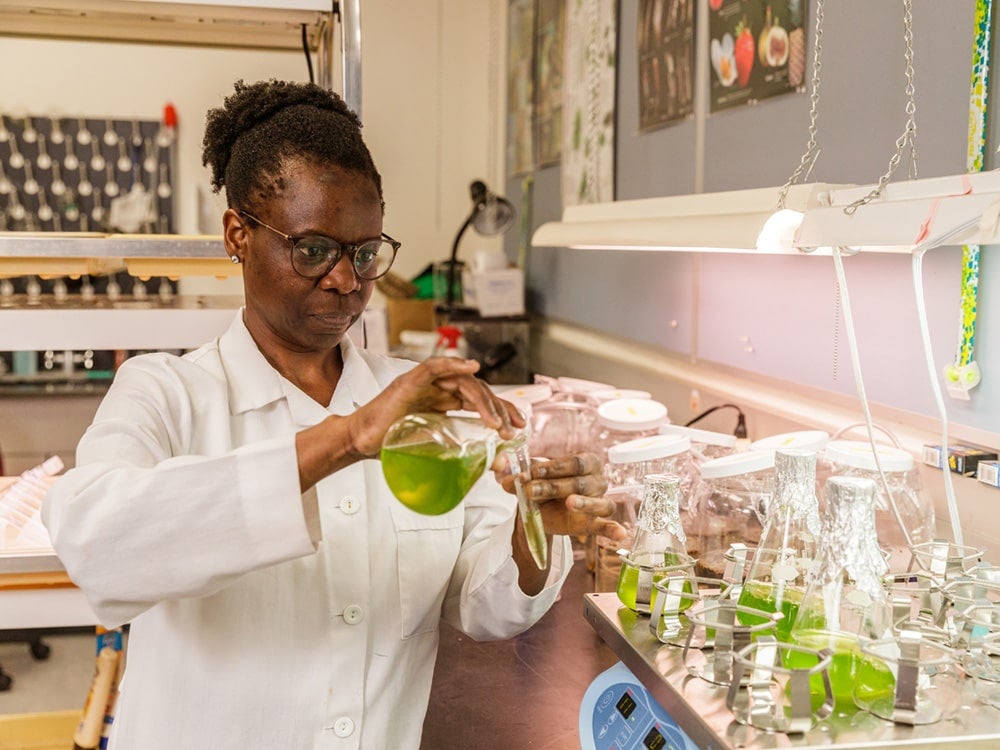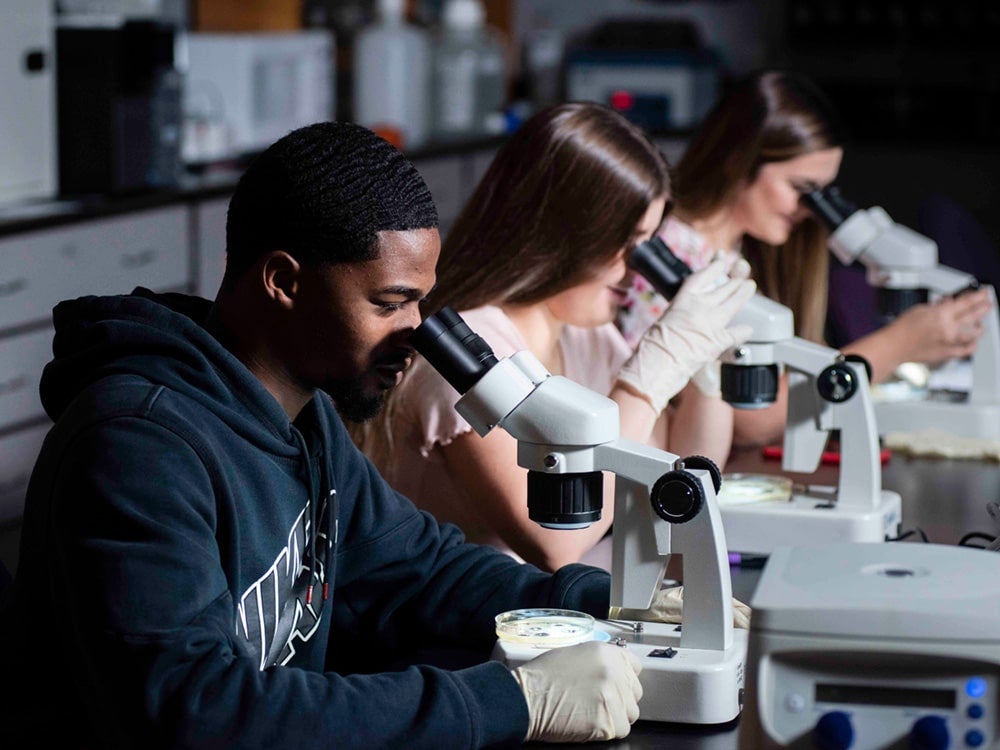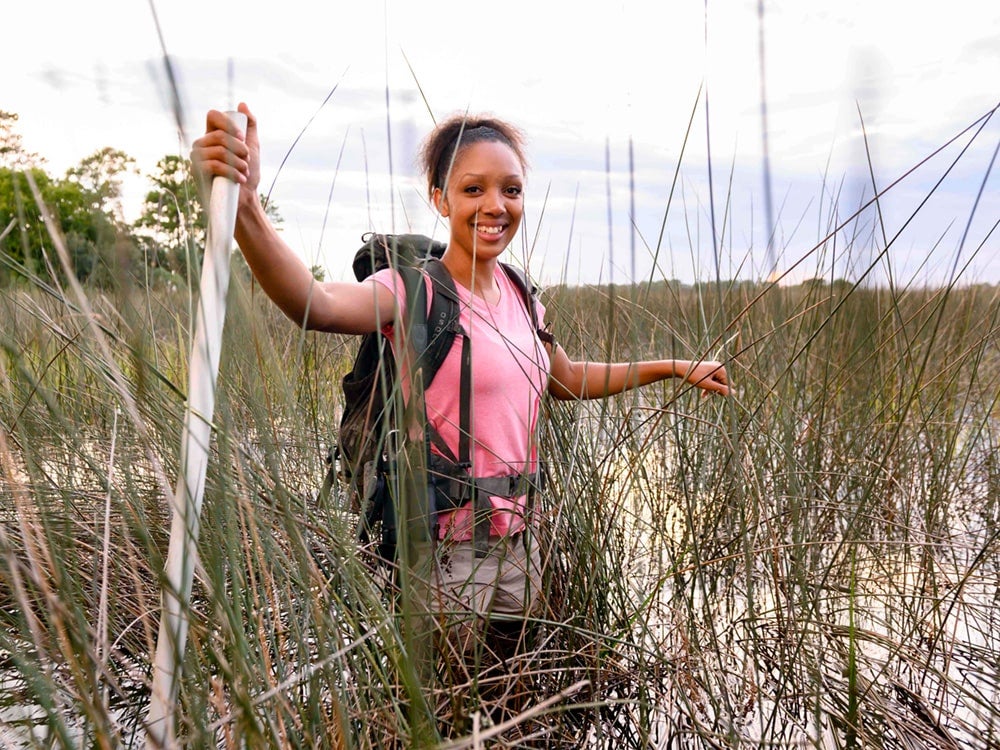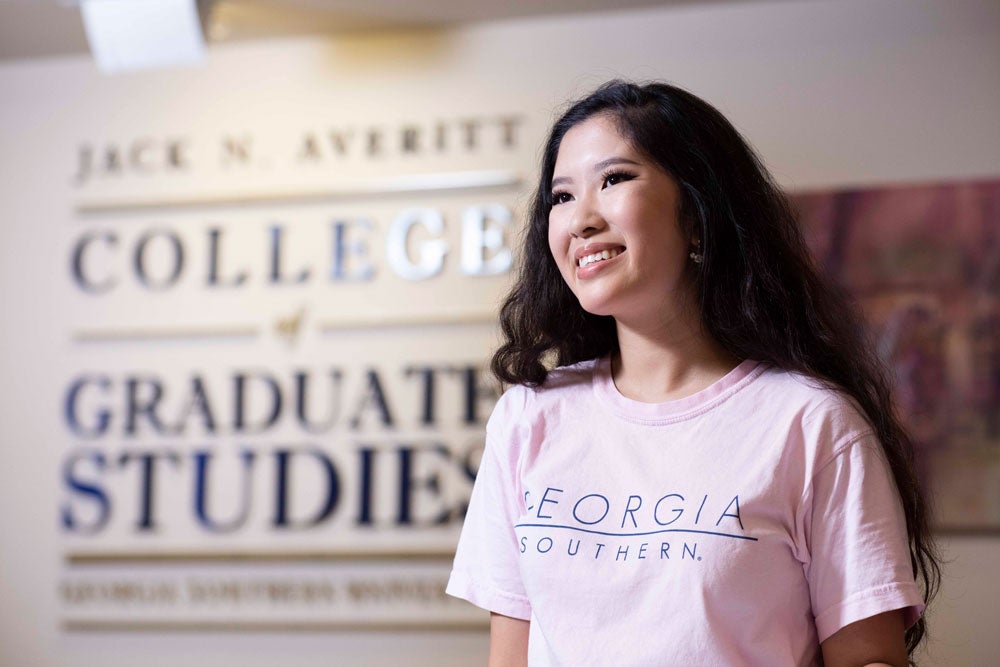Develop skills and experience using cutting-edge equipment and hands-on techniques to prepare for doctoral work, medical school or a successful research career in the biological sciences.
Locations
- Statesboro Campus (In Person)
- Armstrong Campus (In Person)
Why Earn a Master’s in Biology at Georgia Southern?
- Broad-focused department that provides opportunities to specialize in an area that matches your career goals.
- Thesis and non-thesis program formats.
- High faculty-to-student ratio for individualized attention.
- Stipends available as a Graduate Teaching or Research Assistant.
- Convenient access to the amazing biodiversity of the southeastern U.S.
- 30-36 credit hours to completion.
Prepare for a career in the biological, environmental or health sciences in the region’s premier MS program for biology research and education. Through Georgia Southern University’s Master of Science (MS) in Biology program, you’ll discover the breadth you’d expect to find at a larger institution, along with the individualized support of a smaller department. Our team includes more than 50 graduate students and 35 research-active faculty members.
Joining faculty research programs allows you to learn while contributing to scientific discoveries of regional, national and international significance. Courses and research areas reflect our Department of Biology’s strengths in cell and molecular biology, conservation biology, genetics, ecology, evolution, medical entomology and physiology.
Graduates find success in diverse areas ranging from conservation biology to medicine, with 92% of our alumni working in fields related to their studies and one in three going on to receive a Ph.D. or M.D.
Ready to Apply?
What Can You Do With a Master’s in Biology?
A rigorous grounding in biology coupled with a targeted area of specialization sets you on a wide range of career paths in the biological, environmental and health sciences. Graduates excel in industry, government organizations, educational institutions, doctoral programs or medical school.
Where our graduates work:
- Conservation organizations
- Biotechnology companies
- Government agencies
- K-12 schools
- State and national parks
- Research laboratories
What our graduates do:
- Biologist
- Biomedical scientist
- College instructor
- Conservationist
- Environmental scientist
- Forensic scientist
- Microbiologist
- Molecular biologist
- Research scientist
What You’ll Learn
After mastering the principles of biology, an extensive selection of electives in genetics, plant physiology, ecology, toxicology, medical-veterinary entomology, wildlife management and more topics lets you pursue a subdiscipline in line with your career interests. Throughout, you’ll learn to critically evaluate peer-reviewed publications and engage in the work of research in laboratory and field settings.
To strengthen your preparation for doctoral studies, you can choose to write a thesis analyzing the results of an independent research project. Or, select the non-thesis option to gain additional breadth through coursework — ideal for current educators and industry professionals invested in upgrading their knowledge base.
See Full Curriculum (Thesis Option) See Full Curriculum (Non-Thesis Option)Build Your Experience
Grow as a researcher and a professional, preparing for your future as you complement your studies with extensive hands-on exploration and community engagement.

Research
Pursue your interests under expert faculty guidance and contribute to ongoing departmental research efforts, such as exploring the blue carbon potential of restored oyster reefs, examining the roles of emerging contaminants in aquatic and marine environments, discovering helminth parasite diversity from mammals in Vietnam and Mongolia or investigating immune responses in disease vectors like fleas, among other projects.

Biology Organization of Graduate Students (BOGS)
Engage in local initiatives with University and community groups to address environmental concerns. In the process, you’ll make professional connections and expand your social opportunities with fellow grad students.
Want to Learn More?
Explore essential information about our MS in Biology program, including application details, accreditation status, and licensing disclosures. Gain insight into the program’s credibility and requirements to help you start your journey toward success with the knowledge you need.
Applicants for the MS in Biology program must hold a bachelor’s degree from a regionally accredited institution with a minimum cumulative GPA of 2.8 (on a 4.0 scale) with an undergraduate major, or the equivalent, appropriate to the proposed field of study.
Adequately prepared applicants will typically have completed 24 hours of biology, nine (9) hours of mathematics, 16 hours of chemistry (including organic chemistry) and eight (8) hours of physics (or geological science).
To apply, please submit:
- An online application. (There is a $50 nonrefundable application fee.)
- Transcripts for all prior college- and graduate-level work. Copies can be uploaded with your application; official copies sent directly to the Office of Graduate Admissions will be required for admitted students.
- Two letters of recommendation from individuals familiar with your potential to complete successful graduate work.
- A statement of career goals to explain why you are interested in pursuing the degree and your long-term career plans.
Applicants are strongly encouraged to identify and contact a thesis advisor and submit the name to the graduate program director prior to the application deadline. We receive many more applications than we have positions available each semester, so having faculty support is critical for our admissions decisions.
Please submit all supporting materials online to the Office of Graduate Admissions at gradadmissions@georgiasouthern.edu.
International transcripts must be evaluated by a NACES-accredited evaluation service. The evaluation must be course-by-course and include a GPA.
Application Deadlines
Students are admitted to begin in the fall and spring terms.
Fall: Priority – March 1; Final – April 1
Spring: Priority – Oct. 1; Final – Nov. 15
Your application and all required documents must be received by the deadline.
Contact Information
John M. Carroll
Assistant Professor
Department of Biology
jcarroll@georgiasouthern.edu
The Department of Biology supports graduate students via a limited number of teaching assistantships and research assistantships. Two years of financial support is typically guaranteed for accepted students.
Teaching Assistantships
Teaching assistantships are offered on a competitive basis to any qualified full-time graduate student in the Department of Biology. Teaching assistantships are awarded to students in the thesis track. Assistantships include a stipend and a tuition waiver (all but $25 of in-state or out-of-state tuition is waived). As a teaching assistant, you are responsible only for student fees and health insurance.
Teaching assistants in our Department teach laboratory sections for nonmajors in General Biology and/or Environmental Biology, as well as introductory majors’ labs. A typical workload includes in-person instruction each week, plus a prep meeting and grading of assignments.
To be considered for a teaching assistantship, you must apply online directly to the College of Graduate Studies. This application should be completed by the same deadline as a graduate application. (We recommend March 1 for fall admission and Oct. 1 for spring admission.)
Learn MoreResearch Assistantships
Research assistantships are grant-funded and offered on an unpredictable basis by individual faculty members. Research assistants carry out research-related duties in return for a stipend, and their tuition and fees are typically covered by the grant. However, each research assistantship is unique and depends on the particular grant providing the funding.
To be considered for a research assistantship, you should inquire directly with potential faculty advisors. You also can ask the graduate program director about possible research assistantships in the Department.
Other Support
In addition to assistantships, the Department and University offer a limited number of competitive research grants and scholarships. These grants and scholarships generally cover the direct costs of research or classes (e.g., books and supplies); they do not provide a stipend or cover tuition.
Can Restored Oyster Reefs Trap Carbon?
Professor John Carroll, working with a team of students in partnership with Yamaha Rightwaters, is examining whether restored oyster reefs in Georgia can help sequester carbon both by burial in the sediments and by expanding salt marshes behind reefs.
Learn MoreAlumni Highlights
Recent alumni have continued on to Ph.D. programs at schools like Baylor, Clemson, Louisiana State, Penn State, Texas A&M, University of Arizona, University of Georgia, University of Maryland and Virginia Tech, among other prestigious programs. Other alumni have received competitive state (Georgia Sea Grant) and national (Knauss) post-graduate fellowships. Our alumni have also immediately joined the workforce in various local, state and national government-level positions, as well as in industry roles.

Related Programs

Take the Next Step
Whether you intend to pursue research, advance as a teacher or enter the field of medicine, propel your career in the biological, environmental and health sciences forward with a master’s in biology from Georgia Southern.


